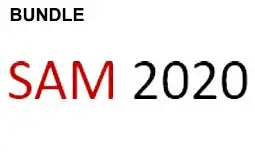Low-cost Beamforming-based DOA Estimation with Model Order Determination
Elias Aboutanios, Aboulnasr Hassanien
-
Members: FreeSPS
IEEE Members: $11.00
Non-members: $15.00Length: 14:21
10 Jun 2020
Direction of Arrival (DOA) estimation algorithms generally assume knowledge of the number of sources. This crucial parameter is either determined by the problem or estimated from the available observations prior to the application
of the DOA estimators. Model order estimation (MOE) strategies via information theoretic criteria such as the Akaike Information Criterion (AIC), Minimum Description Length (MDL), and Hannan-Quinn Criterion (HQC), are usually implemented using the singular value decomposition (SVD) which is computationally expensive. In this work, we incorporate the information theoretic criteria directly into the recently proposed Fast Iterative Interpolation Beamformer (FIIB), thus avoiding the SVD. We derive the expressions for the likelihood function as well as the penalty parameters of the three criteria in terms of the number of sources. The resulting FIIB with MOE algorithm is then able to at once determine the number of sources and estimate their parameters. Simulation results demonstrate that the FIIB-based MOE outperforms the SVD-based MOE. Furthermore the FIIB with MDL achieves a performance that is very close to the original FIIB algorithm.
of the DOA estimators. Model order estimation (MOE) strategies via information theoretic criteria such as the Akaike Information Criterion (AIC), Minimum Description Length (MDL), and Hannan-Quinn Criterion (HQC), are usually implemented using the singular value decomposition (SVD) which is computationally expensive. In this work, we incorporate the information theoretic criteria directly into the recently proposed Fast Iterative Interpolation Beamformer (FIIB), thus avoiding the SVD. We derive the expressions for the likelihood function as well as the penalty parameters of the three criteria in terms of the number of sources. The resulting FIIB with MOE algorithm is then able to at once determine the number of sources and estimate their parameters. Simulation results demonstrate that the FIIB-based MOE outperforms the SVD-based MOE. Furthermore the FIIB with MDL achieves a performance that is very close to the original FIIB algorithm.



